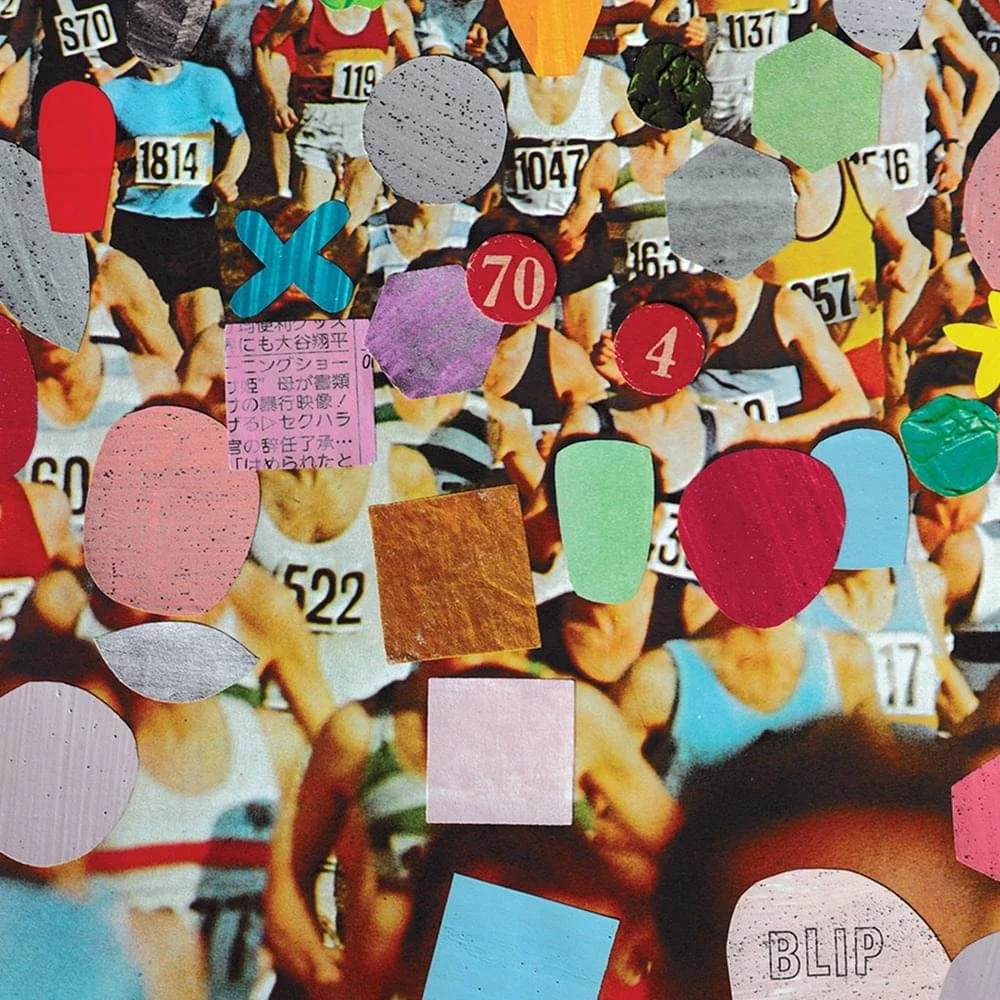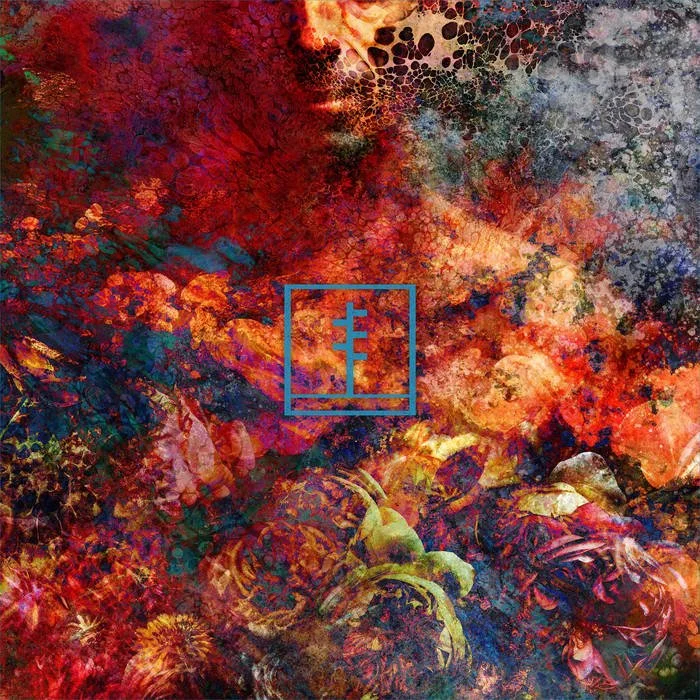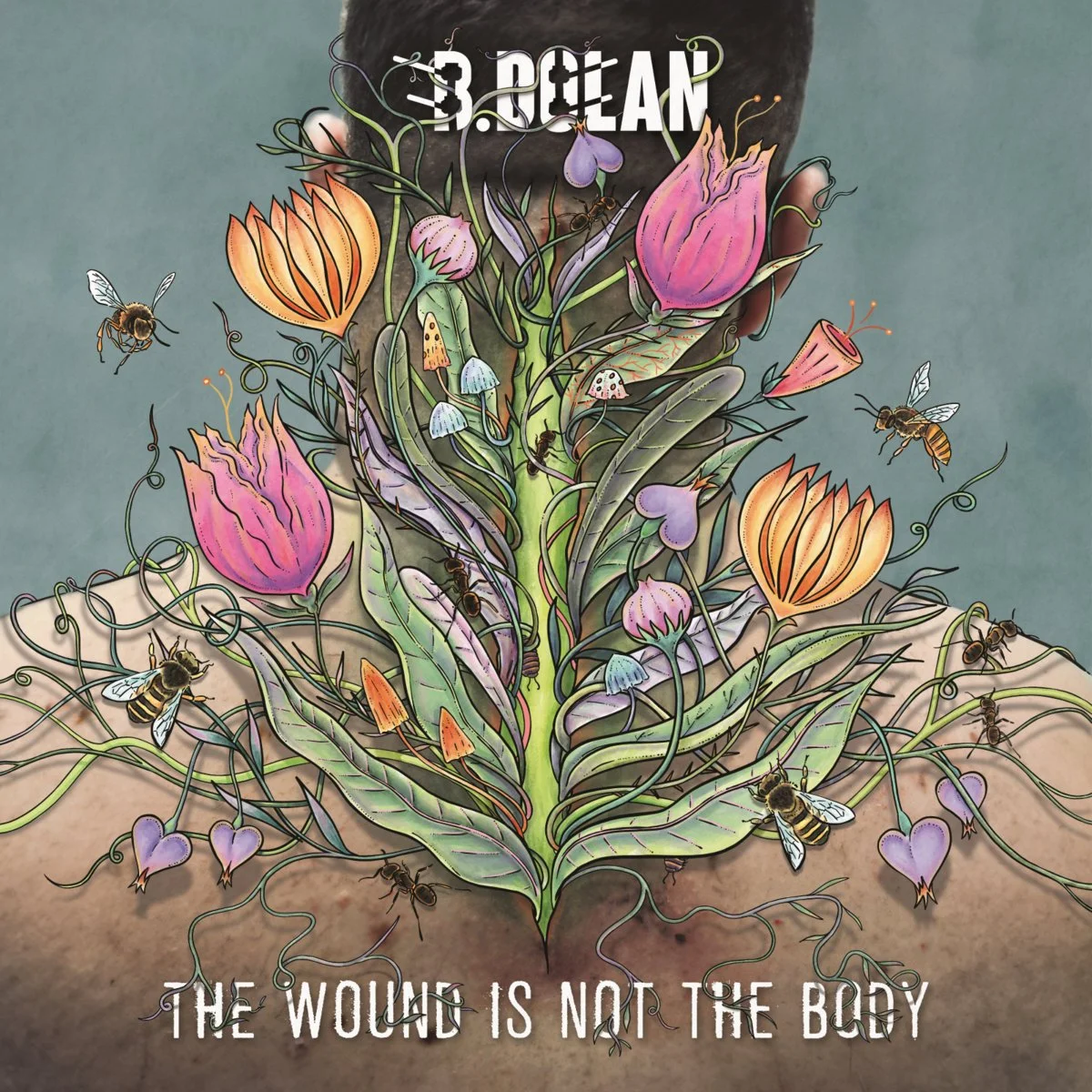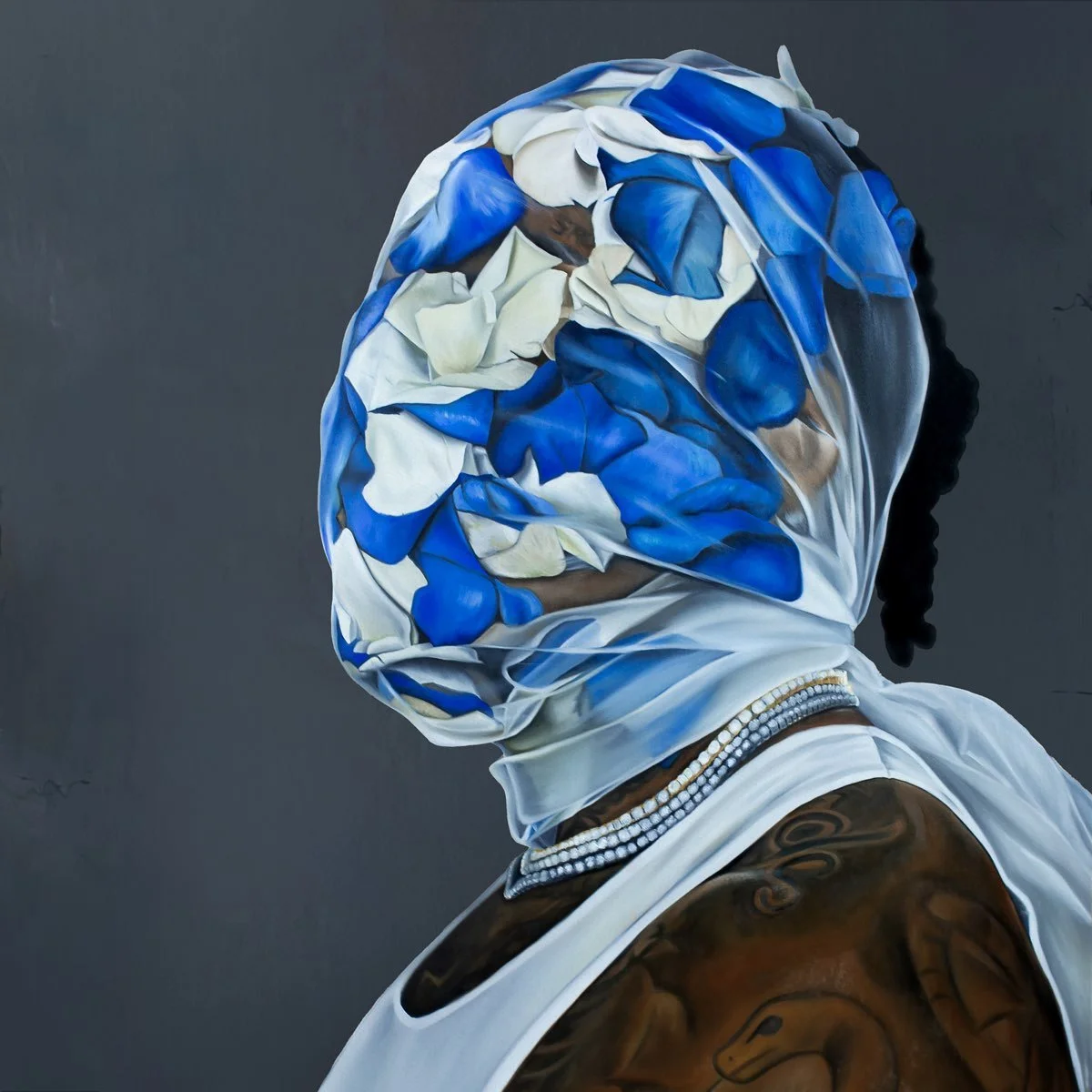on the pulse - 2024 - #8 - gunna, dua lipa, st. vincent, frank turner, adeem the artist, b. dolan, frail body, nahreally & the expert
NAHreally & The Expert - BLIP - So this is a case of me going Bandcamp diving for underground artists who actually post their lyrics - seriously, I’ve got a list of about four or five albums I’d have covered by now if the lyrics were readily available - and NAHreally caught my attention in a deceptively low-key way. He’s a rapper out of New Jersey, he’s been steadily releasing tapes for nearly ten years, many of them being really quick listens, and the best way I would describe him is pairing the low-key, easy-going charm of a Mac Miller with the accessible but wry observations of a Homeboy Sandman or LMNO; I wasn’t always wowed, but the low-key grooves and humour made going through his back catalog pretty enjoyable. So now teaming up with Irish producer The Expert, and with guest features from Open Mike Eagle and Hemlocke Ernst with a slightly more expanded runtime, I wanted to give this a proper chance… and that was worthwhile, because this was a really enjoyable listen that sticks to NAHreally’s formula of deft, self-deprecating observations, but feels more sonically and thematically focused. Granted, in the latter case I really appreciate how NAHreally approaches his ‘rapping about rapping’ metacommentary, mostly because it’s less a showcase of technical prowess and more thoughts about the mechanics of living it; a lot of the observations might feel common sense or pretty easy at first, but they stack up well in aggregate, from the oversaturated media environment that can make it increasingly noisy and stressful to create - which he smartly observes on ‘All At Once’ that in some form has always existed but is just closer at hand now - to then the complicated social languages of performance on ‘Rapper Hands’ and ‘Read The Room’, and then how it’s commodified, branded, and critiqued, especially with folks who put effort into loudly exclaiming their expertise and intelligence and thus reinforce a hierarchy with them at the top - ‘That Many Of Em’ was distinctly funny, and I can appreciate the light jab. And thus I really appreciate that NAHreally shifts the framing to feel so down-to-earth and deliberately small-scale - partially out of knowing his own limitations exacerbated by getting older on ‘Breaking Down In Real Time’ with a hilarious assist from Open Mike Eagle, but also the messy reality of getting by within those systems where in the grand scheme of things so much of it is so small; a blip on the radar, and that’s true for everyone. It’s coupled with a really great understated but forceful critique of those who would be intolerant or exclude or front, more a knowing glance of ‘come on, dude, be better’, but also some solid introspection of how he has to work under the same conditions, through canny self-awareness and staying grounded, which creates a welcome freedom to try new things and savor the little victories, which along with its accessibility, trim runtime, and impeccable vibes makes it a welcoming and amazingly comfortable listen, for a record this direct and not overflowing with bangers, the replay value is high! And The Expert is a great producer for facilitating that vibe - spare melodic guitar loops and hazy samples balancing tasteful old-school drums that have some airy texture but never feels that grimy or heavy, and while the mastering can feel a little overly metallic and flat in moments, it’s damn near consistent to a fault. That’s also probably my biggest critique of this album, because while the sound palette behind this album is plenty enjoyable and very well-sequenced, I’m not sure there’s a sample flip or melody or groove here that would stick out among a lot of producers in this underground lane, if you’re so easy-going that you wind up fading into the background or the songs run together, I’m not sure that’s an asset, especially when NAHreally’s songs can run on the shorter side. There are a few exceptions, though - the opening cut ‘These Days’ has some cinematic swell, I like the warped keys of ‘Read The Room’ and the slick bassline of ‘Bubble Wrap’, and the soft-focus ‘Movement & Light’ with Hemlocke Ernst and the woodwind flutters all over ‘Little Wins’ were really damn pretty. Overall, this is an album that’s going to fly under the radar for a lot of folks, and that’s not surprising - it’s low-key, I wouldn’t say it reinvents any wheels, the sound is certainly familiar… but that being said, NAHreally and The Expert caught a little bit of magic here where the magnetism is subtle but unmistakable. It’s accessible, legit funny, occasionally feeling very real with its insight, and more than a few times touches legit greatness, a smart album that’s not flashy about it and thus all the wiser. In other words, it should be bigger than just a blip on your radar, check it out!
Frail Body - Artificial Bouquet - I’ve been waiting to get around to this one, and this is later than I’d prefer: Frail Body is an Illinois screamo / post-hardcore act sharing some overlap with the goth rock act Bleached Cross, who dropped a self-titled debut in 2022, or the emoviolence act Crowning who put out their debut in 2020. But Frail Body has been around longer than both, with EPs in 2017 but really breaking out in 2019 with a short but well-received debut, and now an even better received follow-up five years later. And I see why, because this is an example of Frail Body taking their dissonant screamo roots and expanding to flesh out their sound considerably, most specifically drawing on the blast beats and melodic tremolo shredding of black metal - and where the inclusion of Jack Shirley behind the boards makes a lot of sense and probably explains why I’ve heard some early Deafheaven comparisons - while not compromising that hammering and grinding bass groove that gives them so much textured, crushing, but dextrous foundation. Hell, you could even make some post-metal comparisons with cuts like ‘Critique Programme’ with its filthy bassline or the thunderous ‘Devotion’ and ‘A Capsule In The Sediment’ running up to or crossing the five minute mark with the more tuneful atmospherics - perhaps not much in the way of conventional melodic hooks, but with the kinetic snarl of ‘Berth’, the demented blastbeats of ‘Horizon Line’, the wild groove changeups on ‘Refrain’, or that incredibly sticky guitarline on ‘No Resolution’, there’s a surprising number of cuts that really did stick for me! If I do have a critique of the execution - outside of that weird panning at the start of ‘Monolith’ - it might come with their vocalist; not that the screams aren’t visceral, but pushed midway back into the mix and without a lot of variation, it can leave you wishing that a more dynamic performance could help the lyrics punch to the surface, or add more character to the overall composition. But on some level I get why the lyrics sit a little further back - necessarily playing to abstraction where more direct details are sparing, but that makes sense for themes that seem to circle grappling with the loss of a loved one and institutions that promise more defined answers that increasingly feel hollow; they would rather have you in line than provide aid or relief, paired with a lingering guilt of not being there enough while this loved one was near or reaching out, and when they return… there’s a painful mundanity in cleaning up the mess and trying to keep living, hopefully find peace. In short, I’m not sure this leaps into the category of my favourite screamo / black metal blends - a little more distinctive variance could have nudged this over the top - but the grooves hit this hard alongside some killer shredding and potent lyrics, I’m comfortably calling this damn close to great; if this sound is your thing and you haven’t heard it already, check it out!
B. Dolan - The Wound Is Not The Body - It has been nine years since we got a solo album from B. Dolan, five years since we got any kind of full-length - that was his stellar team-up with Sage Francis as Epic Beard Men for This Was Supposed To Be Fun, one of the most criminally underrated albums of 2019. Now it’s not altogether surprising - the pandemic made touring a living hell for any independent act, and B. Dolan was keeping somewhat busy streaming - but a factor just as large was how he had to get emergency spinal surgery, which led to a long, arduous recovery in a hospital in a deeply horrible time in healthcare, the sort of harrowing context that for a rapper known for the politically charged, cutting, and personal had this as one of my most anticipated albums of 2024. And having sat with it for a little longer than some… yeah, this is an absolute triumph, and outside of The Failure - which is an artistic piece in a world unto itself - this might be B. Dolan’s best solo album and much to my surprise his most accessible project to date, with a tidy nine songs running just under a half hour! What I love immediately is that it has the feel of a back-to-basics project in the boom-bap percussion and swaggering grooves and soul chops, until you realize that’s not really been a lane for B. Dolan compared to the more twisted experimental production of his earlier catalog, with the feel of a renewal in a new headspace where he can comfortably find a pocket; I don’t love every sample choice like the chipmunked vocal on ‘The Rock Cried Out’ or the uncanny weedy synth behind ‘Selfie Sub’, and some of the vocal mastering can feel a little grainy, but on some level that does fit the production palette and work thematically, as rough edges will naturally occur in reassembling one’s life and self. And besides, when you have the more layered scratching and jingling drums on ‘Turn a Mill’, that seedy horn and warbling behind the striding percussion ‘The Traveler’, the rattling but spacious ‘Fantasy Baseball’, the jaunty pianos underscoring ‘How To Rob The Italians’ which later translates to the creeping dread in the reversed melody and keys against the Griselda-esque sandy drums, and especially the bouncy keys and bass behind ‘The Last Temptation of Wil E. Coyote’, it’s hard not to be reminded of the best moments of Epic Beard Men and how B. Dolan can have a lighter, more tangible sense of humour. And when you’re recovering from such an ailment, you need some of that humour, and I really like how B. Dolan bookends with the album directly addressing his journey, with ‘Turn A Mill’ with explicit references to hospital recovery during the pandemic and ‘Modified Warrior’ showing his return with new strength, but uses all the songs in between to showcase the other things he is reconsidering and is looking to grow beyond; he doesn’t want to be solely characterized by his injury, but he’s using the opportunity to grow. So I like how ‘The Traveller’ shows the level of miscommunication and language barriers that can come with navigating the industry, but also how ardently full of shit the hierarchies said industry reinforces are on one of my favourites, ‘Fantasy Baseball’, highlighting how the conversation around rap is monopolized by mainstream top 5 lists, beholden to best-selling favourites and stans, and how so much of that conversation is built for the commentator’s own clout; quitting that game is better for everyone’s health. But it gets more complicated from there - ‘The Rock Cried Out’ is a more abstract cut but seems to focus on how an artist attracts parasocial and even social fandoms, reinforcing how much they invest in an artist and what does that mean when the artist is grappling with very human struggles that might not be far removed - which is later echoed on the slimy exploration of influencer culture on ‘Selfie Sub’, with desperate male orbiters chasing a world where sex sells and sometimes it can be the fastest dollar for women to get free of the late capitalist trap. Hell, if we’re looking at the truest evil that underscores this album, it is that systemic rot - ‘How To Rob The Italians’ is funny on its face lightly toying with gangsta stereotypes, but by the end of the song it highlights the colonial and imperial legacy of Italian-based empires going back to the Roman times and the Vatican, and those grasping for a cheap imitation of that luxury… and they’re not the only ones, B. Dolan inserts himself into the framing in the grisly ‘Ice Cream Wars’ which is a layered critique of how gang violence gets commodified by the rap industry only to leave ruined families and violence in their wake when they’ve wrung out all the money. And then we get ‘The Last Temptation of Wil E. Coyote’, which takes the Looney Tunes character, draws a parallel to aging, backwards-looking rappers who fancy themselves as macho predators, and then how plainly pathetic it all turns out to be when they keep on failing time and time again; B. Dolan knows these guys have talent and ingenuity, but they’re chasing some gimmicky bullshit that won’t ultimately satisfy them even if they get it… and they haven’t gotten close, so I appreciate the gentle undercurrent of optimism in the critique that maybe there can be a better way. But that better way will not come easy, which takes us back to ‘Modified Warrior’ to take a broader, systemic view: the folks at large who won’t rock the boat for systemic change even as time may be running out within a bad system, a system that might reinforce his position but one that can’t buy into because of how grinding and exploitative it is, to passionlessly chase the easy buck, made all the more stark when he had to rebuild his life largely on his own and is coming to value a community looking for major change. One of the most stark lines on the album is ‘I realized what a violent word ‘normal’ is’ - what has been systemically enabled or allowed to become normal in its existence or absence, and the violence often required to maintain it - and it’s clear after everything B. Dolan has been through, ‘normal’ is no longer in the cards, and for the better. In short, this album rules - it’s brisk, it’s impeccably paced, the wordplay hits the sweet spot of accessible and occasionally funny while having tangible layers and real social commentary, and the production is the most loose and groovy that B. Dolan has ever had; I’ve been listening to this album for a while, the replay value is high, and it’s everything I could have hoped for out of his recovery. One of the best of this year, it’s going to be slept on by way too many - please, check this out!
Adeem The Artist - Anniversary - It’s been remarkable to watch Adeem The Artist’s rise within indie country - I remember vividly when I first started covering them in 2021 from their run on Bandcamp, where it felt like I discovered magic across the stellar Cast Iron Pansexual and White Trash Revelry, two of the best albums of their respective years. But Anniversary promised to be a very different experience, where production duties were now being handled by mainstream veteran Butch Walker, a childhood hero of Adeem’s; I’ll be honest, I had some reservations around this, part of their magic was how they could bend the subtleties of their sound to compliment their themes, and subtlety isn’t normally in the cards with Walker. But hey, Adeem The Artist going for more of a early 90s country rock sound could be cool, their songwriting would undoubtedly kick ass… which is why I want to be careful in discussing this album because I can recognize why they brought in Butch Walker and the trend from White Trash Revelry to here: helping expand and flesh out Adeem’s sound, play to a bigger stage as a rising star, give them the most muscle they’ve ever had on record, convey a driving sense of urgency that cannot be ignored. And for a larger mainstream audience, potentially even one tapped into the radio, Walker’s louder mix with chunkier guitars and more polish makes sense, that audience isn’t going to care about the production intricacies that play to a softer palette, and it can even function as adding more teeth to Adeem The Artist’s writing, which easily treads into some of their darkest and bluntest territory yet. And here’s where this is tricky for me: it’s a lot like a stage-trained actor in a bombastic superhero movie, or a extremely talented and intricate west coast MC hopping on a beat from DJ Mustard to make a very relevant comparison: it’s not that it can’t be done, but it doesn’t always flatter their strengths in the way restraint and subtlety and complexity do. And Butch Walker is not the producer for subtlety: everything feels louder and brighter in a sharper high-midrange and more compressed - especially the drums, which can sound distractingly loud compared to the vocal mix, which is considerably rougher; I can hear Adeem trying to figure out how to get their voice and theatricality to play with a broader palette, and it’s not a clean fit, especially on a few of the more stripped-down ballads. And what’s frustrating is that it’s less a total misstep than inconsistent: the soft-focus barroom romance of ‘One Night Stand’, the driving blur of anger and fear on ‘Nightmare’, the delicate contemplation of time in a relationship on ‘Part And Parcel’ and when watching their child grow up on ‘Rotations’, the heartbroken horror of ‘Night Sweats’ at seeing the violent devastation in Gaza, those songs absolutely work… but when you get ‘Socialite Blues’ with the big brass band, on top of being an aesthetic choice I’ve never been that fond of, it’s easily the clunkiest song on the album. And I wish I could say it just stopped with the production, because then we get to the writing and themes and where I’m reminded that my favourite Adeem The Artist songs are emotionally complex and often very specific: ‘Middle of a Heart’, ‘Judas’, ‘Reclaim My Name’, ‘You Should Have Been A Cowboy’, whereas here… I just don’t think we get much that approaches that territory consistently. Now some of that is intentional: Adeem has described this album thematically as exploring cycles, sometimes of love and family, but just as often of violence, progress met by backlash, and given the bigoted, queerphobic violence and government policies that have sprung up across the United States especially in Tennessee, it makes sense to be direct in confronting that; ‘Nightmare’ is very explicit in highlighting a parallel between persecution directed at one’s gender versus religious belief. And it’s a reason I really like when Adeem takes traditional country structures and narratives and makes them their own, to highlight how there’s really not so much of a difference, and it’s often constructed - the very direct closing cut ‘White Mule, Black Man’ highlights how superstition, corruption, and racism played into the lynch mobs of their hometown of Knoxville. Hell, ‘Plot of Land’ absolutely rips with its guitar solo, but touches directly on this and to my surprise it’s a very hopeful narrative for positive change! Plus Adeem The Artist is aware of their place in those cycles, and will extend a lot of empathy: ‘Wounded Astronaut’ confronts examples when they were a bad friend or partner to women, ‘Nancy’ describes a relationship that alternates between mutually destructive and genuinely tender, and it’s hard not to escape the feeling of culpability behind atrociously cynical and wrong-headed US foreign policy on ‘Night Sweats’. Granted, I’m not sure the sequencing of this project does it many favours - this project ends on a very grim note with its last two songs, and while it’s effective in its messaging, it does colour the mood of the project to feel more melancholic overall, and when you have a song like ‘Carry You Down’ which feels a little lyrically thin followed by ‘Socialite Blues’, it can feel uneven. But as a whole, though… look, I know this is coming off as more negative than it should be - which might feel apropos given this album - but I want to stress that this is not a bad project by any means, it often feels like it’s tipping into greatness, and if you’re more of a fan of the beefier, radio country rock sound, this is a more accessible and immediate project, you can’t argue that this progression was not set up, nor that it doesn’t succeed in what it sets out to do. My frustration is the context of their previous albums, which I think are more to my taste in production where the writing feels more consistently strong, and even then there are enough great songs here to make this absolutely worth a lot of listens. Not my personal favourite of theirs, but it’s absolutely strong enough to be worth hearing and supporting, give them a proper shot!
Frank Turner - Undefeated - One of the most striking pandemic albums is FTHC by Frank Turner from 2022, where fried nerves and forced introspection pushed Turner into a very difficult place. It’s great if aged a little weird in retrospect, but it put Turner back on the map and his first #1 album in the UK! So now with greater independent freedom, we have this… and it’s a mixed bag? It feels like a diffuse victory lap of broader anthemic sloganeering paired with fragmented observations of a world drifting past him, full of lost connections as he attempts to reconcile the past, leading to its best indie rock-leaning cuts like ‘Pandemic PTSD’, ‘Ceasefire’, and ‘Somewhere Inbetween’. But the home production job, while competent, lacks the muscle or driving crescendos of his best, Turner’s voice has really taken a beating, and it feels too compositionally safe to land its emotional gutpunches. Certainly not his worst, it’s passable… but this might wind up a pyrrhic victory.
St. Vincent - All Born Screaming - I’m not sure where the shine started slipping from St. Vincent - I think some will argue MASSEDUCTION, which I understand but disagree because that album’s best pop moments have actually held up - but in trying so hard to be charitable to Daddy’s Home in 2021 where there were waves of critical acclaim that felt completely off-balance, I’ve really come to dislike that album and I don’t think I’m alone there, partially for Jack Antonoff mishandling the production but especially in the writing, where the themes and execution felt well-researched but in service of a really wonky, self-serving thesis. So I had lower expectations than most for this album - the critical acclaim has once again felt over-the-top - where St. Vincent was taking over all production duties and recruiting Justin Meldel-Johnson for engineering. And the result is… look, it’s better than Daddy’s Home, and on paper, an album like this could really work: leaning back towards the darker, roiling indie rock that characterized her peak years, paired with a more refined sense of groove that came from her last few albums that might even tilt towards industrial - less driven for alienation than for a looser, more accessible swagger. Or at least that’s what the singles seemed to be implying, and what in interviews St. Vincent seemed to be seeking - sick of those trying to define and control her and exasperated with trying to ‘sell’ authenticity, stepping away from the artifice and deflective irony and masks for something that ‘feels’ authentic to her, regardless of how it turns out for everyone else, with the first half all about confronting brutal loss both internal and external, and the latter being ‘well, we have to get through SOMEHOW’, finding transcendence amidst a living hell. Those are themes I know I find resonant… and I know that because it’s been the emotional subtext behind St. Vincent’s best albums, where in contrast All Born Screaming is a lot less impressive in execution. Part of this is the songwriting: I don’t know what happened in the past six years, but there was a visceral, tactile grit to St. Vincent’s best writing which is just gone now, and it’s all the more glaring when this is trying to evoke that shock and it’s been replaced with language that feels like it’s holding an audience at arm’s length, trying to grasp a personal edge that used to come more naturally. A lot of folks have highlighted the awkward ‘tribute’ to SOPHIE on ‘Sweetest Fruit’, which I wasn’t against with the context that the song is about young queer people seeking transcendence as she later references Daniel Sotomayor who died of AIDS on the second verse, but the possessive pronouns of calling them ‘my’ is a really awkward choice, and it’s not the only time that happens - on ‘The Power’s Out’ describing an apocalyptic scenario in New York City, the one person who dies in the song is a queer person who commits suicide with a line to ‘remember me smiling’, which just feels weirdly tacky and detached, playing into really dated tropes. And then there’s more than a few moments where she references being watched and scrutinized and critiqued like on the outros of ‘Hell Is Near’ and ‘Reckless’, or the entirety of ‘Broken Man’ and ‘Big Time Nothing’, the last of which is from the perspective of her own depression but for an album all about getting to the most raw moments, there’s a frustrated, cagey side to the writing which feels off; ironic given that Taylor Swift also had a lot of that on her newest album and I liked it a lot more there, and I think it comes down to how where Swift threw open the floodgates for better and for worse, St. Vincent clams up; the impact feels blunted, it doesn’t feel go for broke in ways I know she can! And that might be the fault of her production, where I can appreciate St. Vincent taking a larger role and getting highly acclaimed drummers like Dave Grohl, Josh Freese, and Mark Guiliana to back up her grooves… and it leaves me thinking the actual tunes might be the problem, where the weirder edges in the keys and guitar a producer like John Congleton would accentuate, here they feel squelchy and faded and underpowered with grainy highs clipping the edges, with her voice pushed a bit deeper into the mix which doesn’t flatter her presence. Now there are moments that get close to really working - ‘Flea’ feeling more self-contained in its wonky sleaze almost stuck the landing before we get a warbling, 70s-prog bridge that I wish I liked more, the bassy Nine Inch Nails-esque swagger to ‘Big Time Nothing’ tries to infuse some synthfunk and feels like something Prince would have nailed, and the sweaty horns over the noir touches on ‘Violent Times’ has had folks call it a Bond song and I can hear it! I certainly prefer those to the goopy squonk of ‘Sweetest Fruit’ which squanders a pretty terrific galloping groove or the drippy cod-reggae of ‘So Many Planets’ which features a great guitar solo I wish could get out from under all the effects Justin Meldel-Johnson dumps on top of it, or the dippy rollick of the title track which features support from Cate Le Bon that builds into an impressive outro but I’m not sure it’s enough, the final third of this album really tanks it for me. In short, there’s a tangible frustration St. Vincent has shown in the press run for this album around ‘selling authenticity’, where it can feel like bullshit and you should be willing to accept the artist where they are at, of which I agree, but with All Born Screaming it feels like I’m getting a bait-and-switch, where minus the pedestal she had from Actor to Masseduction, not only do I feel like punches are being pulled, the flaws and missteps are way more glaring. I’m reminded a lot of Sleater-Kinney’s album Little Rope from earlier this year, where on paper I can buy in, but the execution feels mishandled and weirdly listless, lacking the vibrant flair of her best. I dunno, it’s decent and it’s not her worst, but if we’re all born screaming, I think I know where she may have stopped.
Dua Lipa - Radical Optimism - You know, I genuinely feel bad for Dua Lipa here - aside from the fact that it’s been longer than I would advise to get a new album released since Future Nostalgia, even if she’s had consistent crossover radio success in the mean time, her run-up for this album has been rough. ‘Houdini’ is still a great song but she’s had diminishing returns since, and I had the sinking feeling that it would have to be the album making some impact to salvage things… and she drops in the middle of a historic beef that has sucked the oxygen for everything else music out of the room. But hey, she still did put out an album and with both Danny L Harle and Kevin Parker of Tame Impala behind her, there was at least the pedigree for quality, ‘Houdini’ proved that… and yet the more listens I’ve given to Radical Optimism, the more I’m left perplexed across the board; not that it’s bad, but it might not be as effective as it’s looking to be… weirdly across the board, which for an artist who is so efficiently controlled is an odd sidestep. And we have to start with the sound, where the blazing flair of nu-disco and 80s worship has been switched out for something that’s absolutely my nostalgia window of very late 90s dance-pop with all the acoustic guitars, more slight disco flourishes, fussy percussion, and soft-focus glittery opulence, in that sweet spot between the boy band wars and 9/11, where I was openly expecting a huge power ballad with a key change! Of course, Dua Lipa is not the first modern pop diva to look at this era with nostalgia - the fact that Caroline Polachek shares a few cowriters and producers with Dua Lipa and put out Desire, I Want To Turn Into You last year is hard to overlook, especially given some lingering sonic parallels across cuts like ‘End Of An Era’ and ‘Maria’ plus similar vocal timbres, which is not exactly a favourable comparison - but I was also reminded of when Lady Gaga made her dance floor throwback with Chromatica and more reliance on big vocal flourishes… ironically in 2020, where compared to Future Nostalgia it just didn’t capture the same verve. And it’s not like Dua Lipa doesn’t commit with tangible power, but she’s considerably less subtle as a vocalist and that might demand production that has a more distinct driving melody then the elegantly intricate acoustic pop/R&B of ‘French Exit’ - more Max Martin in the mix in comparison with Kevin Parker who is proving to be a strangely inflexible pop producer, where you fit in his niche rather than the other way around, to say nothing of wonky overcompression on cuts that don’t need it like ‘Anything For Love’. Now what becomes strange is that when you consider this album thematically, going for a sound this breezy and lightly bouncy makes a lot of sense - lyrically this album is careening across dance floor hookups, many fleeting passionate moments but few that feel stable or anything built long-term, which seems to be what she wants but can’t find someone to match her intensity; an album built for the summer but looking past it to the fall. And the title makes sense in that regard - Dua Lipa seems to have high standards for who she seeks, those who can make it through ‘training season’, and as for much as the album title has been mocked as girlboss pablum, you kind of need radical optimism to keep on looking if you’re not connecting or, pardon the throwback, scared to be lonely. But with an album drenched in a summer palette, it’s weird how little revelry there is - it seems like Dua Lipa is too efficient to indulge that, there’s confident maturity but it feels very calculated and meticulous, perhaps to its detriment; it leads to a lingering, frustrated tension that undercuts an album trying to be so breezy and go with the flow, especially given how full-force Dua Lipa is as a performer. The odd thing is that I wouldn’t even say it’s precisely a weakness: in many ways it’s a different thematic flavour of what was on Future Nostalgia, just perhaps with a sound that more naturally flattered her strengths and was more strikingly immediate, and I said at the time that album was a side-step from the self-titled project! And even then, outside of ‘Houdini’ I think there are really potent moments, like the sinuous bass driving across the glitter on ‘Whatcha Doing’ with that terrific drum switchup on the second verse, or the hazy acoustic shuffle of ‘Maria’, or ‘Falling Forever’ with its huge gallop and probably the most impressive showcase of Dua Lipa’s vocals to date! Overall, I understand why folks would call this Dua Lipa’s weakest album coming off of Future Nostalgia if they’re not willing to put in the patience for it - especially as ‘Illusion’ is an outright bad song that’s being pushed as a single, I’ve really turned on it since Billboard BREAKDOWN - and truth be told, Dua Lipa remains an evasive figure as an artist, very technically polished and near-scientific as a pop entertainer, but it might be tough to grasp something deeper or personal especially when the art is less immediate. If you’re just looking for the summer bops, this album delivered more than I thought, there are songs that’ll sneak up on you… but three albums in she may have a high floor of quality but a lower ceiling, I’m hearing more subtle variation than evolution. It’s not great, but I’ll lean on the optimistic side: this is quite good, and will probably play better as the summer rolls through.
Gunna - One Of Wun - I liked a Gift & a Curse more than I ever thought I would - the production was remarkably solid, and while Gunna’s flexing was rarely interesting, he had to rap to save his career, and between the lines I’d argue he pulled it off, getting his biggest hit to boot! But One of Wun shows him falling back into bad habits aka his comfort zone, especially leaving ‘bittersweet’ off for no good reason. I still think the production is better quality overall with touches of flute-accented liquid opulence, and Roddy Ricch, Normani, and Leon Bridges try to add variance, but without grounded, personal urgency, Gunna’s flexing about sex, drugs, and brand names is shallow and interchangeable. And with weaker hooks, sloppy Young Thug imitations, a fair few dud lines, and a less consistent flow going way too long, the crooning and triplet flows just aren’t distinct or interesting. It’s got moments, it’s not terrible… but back to this lane, I’ve stopped caring.








